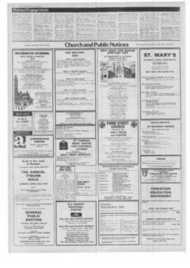Page 6, 6th April 1979
Page 6

Report an error
Noticed an error on this page?If you've noticed an error in this article please click here to report it.
Tags
Share
Related articles
Church Music Shattering, Says Mawby
Concerts
Where We Have Failed
Music Master Search
You Get To Know Your Neighbours When Your Wife Is Laid Up
Arts Page
Singing ecumenism
Colin Mawby, the former Master of Music at Westminster Cathedral, reviews a new venture in ecumenism and hymn-singing.
With One Voice: The Australian Hymn Book (Collins, Harmony Edition, f5.90: with Catholic Supplement to be published in the autumn, £6.50; Melody Edition £1.85).
Recent years have seen the publication of many hymn-books, ranging from the "Folk Hymnals" of Kevin Mayhew to the traditional "Parish Hymn Book" of L. J. Carey. The latest addition to this collection, "With One Voice". is an ecumenically designed book and was originally published in Australia.
'The book was compiled by an eminent committee, and the opening of their foreword throws considerable light upon their work: "Various hymn books have been produced by or for individual churches.
"While many hymns were held in common, the full scope of this agreement was not widely recognised.
"Some churches in Australia began to conceive the notion of a contemporary ecumenical hymnbook. In 1968 the Australian Hymn-Book Committee was formed. It represented the Anglican, Congregational, Methodist and Presbyterian Churches of Australia. _ "In 1974 Roman Catholic representatives were added to the committee. The resultant publication of this book is a significant token of fellowship".
This new hymn-book is a superb anthology of Christian hymnody. Its theology is centred upon God, Creation, Redemption, Jesus Christ, The Holy Spirit, the Scriptures, the Church and Discipleship.
Printing standards, apart from some had alignment of notes in the Harmony Edition, are excellent. The Melody Edition has soft binding. Its type face is small and this will present problems to the short-sighted. The Harmony Edition, which is hard-backed, is printed with exceptional clarity.
A liymn-book of this nature is long overdue and the compilers are to be congratulated on producing such a comprehensive publication. The book contains 578 hymns and psalms, a quarter of them written in this century and about 100 since 1945. There is also a representative selection of Gelineau psalmody. Erik Routley sums up the book's achievement when he describes it as asserting "the supremacy of sound doctrine over trendiness."
However. I have reservations. The main one concerns the
alterations in certain texts. I can understand the reasons for wishing to bring hymns up to date, but it's difficult to find satisfactory criteria by which to do this. The editors, who point out that some of their changes are really a return to original wording. make a strong case for their amendments; however, their judgments are inevitably subjective.
Why, for example, change the opening line of the well-loved carol "God rest you merry gentlemen" to "God rest you merry people all"? Again, why so many changes in "Bethlehem of noblest cities"? Its first line now reads "Earth has many a 'noble city", a line which has the added complication of an-extra syllable. 1 hese are just two examples : there are many more.
There's also considerable inconsistency in the modernisation of the "Thou, Thee and Thy" forms. Hymn 206 says: "Thou didst leave thy throne and thy kingly crown" yet one of our most famous hymns has become "The day you gave us, Lord, is ended," I also confess amazement at the mauling given to the hymn "0 come and mourn with me awhile", It has been reduced from seven to three verses. and the reference to Our Lady in Verse 1 has been carefully removed. Obviously the editorial committee had difficulty in swallowing Faber's purple poetry, I agree with them, but this cannot be considered sufficient reason for castrating Faber's work.
Incidentally, why has the hymn "All people that on earth do dwell" lost its doxology?
I cannot help feeling that it's wiser to leave the texts of hymns as they are. If editors suspect that they mean little to a contemporary generation the solution is to omit them.
Later this year a Catholic edition of "With One Voice" is to be published. It will include a further 45 hymns specifically suited to Catholic worship. (I find it difficult to understand why a comprehensive ecumenical hymn-book needs a Catholic edition).
Even so, if you like traditional Catholic hymnody and piety this is not the book for you. IL however, you feel that many traditional Catholic hymns are outdated, this book is ideal. Its scope is great, its contents comprehensive and its achievement massive. I strongly recommend it.
blog comments powered by Disqus











